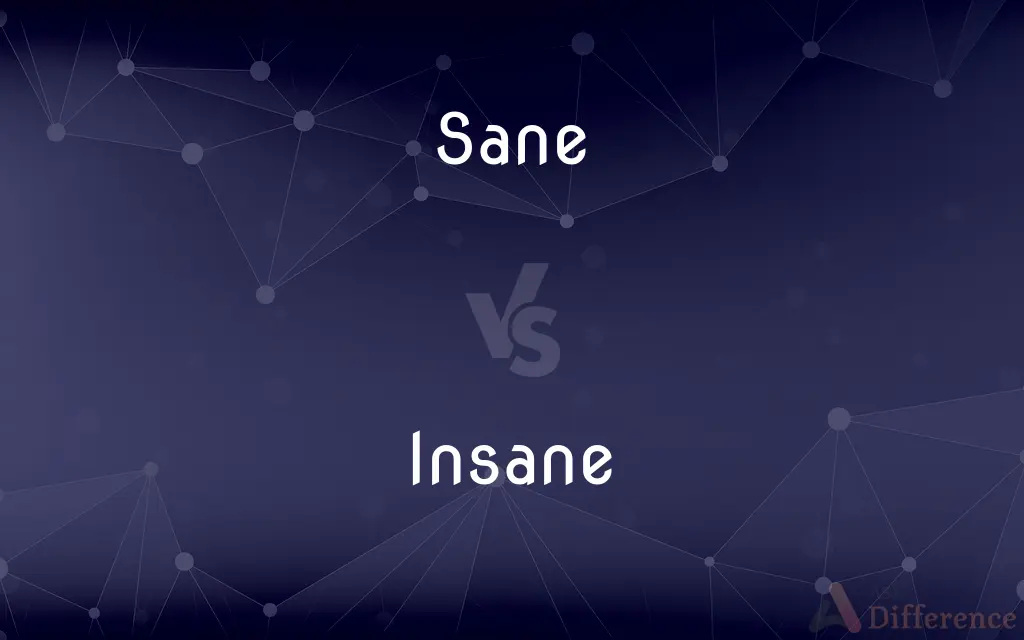Sane vs. Insane — What's the Difference?
Edited by Tayyaba Rehman — By Maham Liaqat — Updated on April 23, 2024
Sane refers to mental health stability and rationality, often legally recognized, while insane typically describes severe mental illness or irrationality, impacting understanding or behavior.

Difference Between Sane and Insane
Table of Contents
ADVERTISEMENT
Key Differences
Sane is characterized by sound mental health, rational thoughts, and the ability to understand reality and make reasoned decisions. On the other hand, insane often describes a condition where an individual's mental health severely impairs their thinking, emotions, and understanding of reality.
While sane individuals are recognized as capable of managing their affairs and making legal decisions, those considered insane may be legally incapacitated due to their inability to function rationally.
Sanity is associated with the capability to follow societal norms and make coherent judgments, insanity can involve erratic behaviors and perceptions that deviate significantly from the norm. On the other hand, sanity is usually a prerequisite for responsibilities like signing contracts or testifying in court, reflecting its importance in social and legal contexts.
Comparison Chart
Definition
Mentally healthy and rational.
Suffering from severe mental illness.
Legal Recognition
Considered capable of making decisions.
Often considered legally incapacitated.
ADVERTISEMENT
Social Perception
Viewed as stable and reliable.
Perceived as unpredictable or dangerous.
Decision Making
Able to make reasoned choices.
Impaired judgment and reasoning.
Behavioral Norms
Adheres to societal norms.
Deviates significantly from the norm.
Compare with Definitions
Sane
Mentally healthy and rational.
The judge declared him sane after the psychological evaluation.
Insane
Afflicted with severe mental illness.
The character in the story was driven insane by isolation.
Sane
Showing sound judgment.
His sane advice helped us avoid a disastrous decision.
Insane
Deviating from rational thought.
Her theories were dismissed as completely insane by her peers.
Sane
Compliant with societal norms.
His behavior was completely sane and appropriate at the meeting.
Insane
Exhibiting irrational behaviors.
His actions were so erratic they seemed insane.
Sane
Capable of making logical decisions.
She was found perfectly sane and in control of her faculties.
Insane
Associated with extreme unpredictability.
The plot twist in the movie was absolutely insane.
Sane
Legally recognized as competent.
As a sane individual, he was qualified to enter into contracts.
Insane
Legally declared mentally incompetent.
Found insane, he was not responsible for his actions under the law.
Sane
Of sound mind; mentally healthy.
Insane
Of, exhibiting, or afflicted with mental derangement. Not used in psychiatric diagnosis.
Sane
Having or showing sound judgment; reasonable.
Insane
Characteristic of or associated with persons who are mentally deranged
An insane laugh.
Insane babbling.
Sane
Being in a healthy condition; not deranged; thinking rationally.
A sane mind
Insane
Intended for use by such persons
An insane asylum.
Sane
Mentally sound; possessing a rational mind; having the mental faculties in such condition as to be able to anticipate and judge the effect of one's actions in an ordinary manner.
A sane person
Insane
Having been determined to be in a condition that meets the legal definition of insanity.
Sane
Rational; reasonable; sensible.
Try to go to bed at a sane time before your exams.
Insane
Immoderate; wild
Insane jealousy.
Sane
Being in a healthy condition; not deranged; acting rationally; - said of the mind.
Insane
Very foolish; absurd
Took insane risks behind the wheel.
Sane
Mentally sound; possessing a rational mind; having the mental faculties in such condition as to be able to anticipate and judge of the effect of one's actions in an ordinary maner; - said of persons.
Insane
Exhibiting unsoundness or disorder of mind; not sane; utterly mad.
Sane
Mentally healthy; free from mental disorder;
Appears to be completely sane
Insane
Used by or relating to insane people.
An insane hospital
An insane asylum
Sane
Marked by sound judgment;
Sane nuclear policy
Insane
Causing insanity or madness.
Insane
(informal) Characterized by insanity or the utmost folly; ridiculous; impractical.
An insane plan
An insane amount of money
Insane
(slang) Extremely good; incredibly amazing.
That guy is insane at FPS games.
Insane
Exhibiting unsoundness or disorder of mind; not sane; mad; deranged in mind; delirious; distracted. See Insanity, 2.
Insane
Used by, or appropriated to, insane persons; as, an insane hospital.
Insane
Causing insanity or madness.
Or have we eaten on the insanerootThat takes the reason prisoner ?
Insane
Characterized by insanity or the utmost folly; chimerical; unpractical; as, an insane plan, attempt, etc.
I know not which was the insane measure.
Insane
Afflicted with or characteristic of mental derangement;
Was declared insane
Insane laughter
Insane
Very foolish;
Harebrained ideas
Took insane risks behind the wheel
A completely mad scheme to build a bridge between two mountains
Common Curiosities
What are common misconceptions about insanity?
A common misconception is that insanity is always linked to violence; however, most individuals with mental illness are not violent.
How is sanity assessed in a legal context?
Sanity in legal contexts is assessed through psychological evaluations that determine an individual's understanding of reality and decision-making capabilities.
How do cultural differences impact the perception of sanity?
Cultural differences can significantly influence what behaviors are considered sane or insane, varying with societal norms and values.
Can a sane person become insane?
Yes, individuals can develop mental health conditions that lead to insanity due to various factors like genetics, trauma, or physical illness.
Is insanity always permanent?
Not necessarily; some individuals may experience periods of insanity due to acute conditions or disturbances that can be treated or resolved.
What legal rights are impacted by a diagnosis of insanity?
A diagnosis of insanity can impact legal rights such as voting, driving, and the ability to enter into contracts.
What role does therapy play in treating insanity?
Therapy plays a crucial role in treating many forms of mental illness, aiming to restore cognitive functions and emotional stability.
What constitutes being legally sane?
Being legally sane means being recognized as capable of making rational decisions and understanding one’s actions.
Can someone be temporarily insane?
Yes, legal and medical frameworks recognize temporary insanity, often triggered by extreme stress or trauma.
What is the importance of determining sanity in court cases?
Determining sanity in court cases is essential for establishing a defendant’s responsibility for their actions and appropriateness of legal consequences.
How do medications affect a person's sanity?
Medications can stabilize brain chemistry and help maintain or restore sanity in individuals with mental health disorders.
How do legal systems differentiate between sane and insane criminals?
Legal systems use mental health evaluations to determine if a criminal was sane at the time of committing a crime, impacting their culpability and sentencing.
Share Your Discovery

Previous Comparison
Proscriptive vs. Prescriptive
Next Comparison
Tracheostomy vs. TracheotomyAuthor Spotlight
Written by
Maham LiaqatEdited by
Tayyaba RehmanTayyaba Rehman is a distinguished writer, currently serving as a primary contributor to askdifference.com. As a researcher in semantics and etymology, Tayyaba's passion for the complexity of languages and their distinctions has found a perfect home on the platform. Tayyaba delves into the intricacies of language, distinguishing between commonly confused words and phrases, thereby providing clarity for readers worldwide.














































